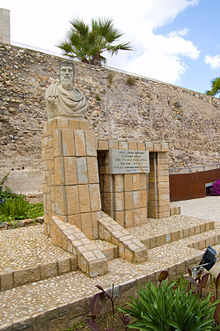Hasdrubal the Fair (Punic: 𐤏𐤆𐤓𐤁𐤏𐤋,[1] ʿAzrobaʿl; c. 270–221 BC) was a Carthaginian military leader and politician, governor in Iberia after Hamilcar Barca's death, and founder of Cartagena.[2]
Hasdrubal the Fair | |
|---|---|
 Hasdrubal bust in Cartagena, Spain | |
| Born | Circa 270 BC Carthage |
| Died | 221 BC |
| Cause of death | Assassination |
| Occupation(s) | Military leader and politician |
| Predecessor | Hamilcar Barca |
| Successor | Hannibal |
Family
editLivy's History of Rome records that Hasdrubal was the brother-in-law of the Carthaginian leader Hannibal and son-in-law of Hamilcar Barca.[3]
Career
editHasdrubal followed Hamilcar in his campaign against the governing aristocracy at Carthage at the close of the First Punic War, and in his subsequent career of conquest in Hispania. In 237 BC, they parted towards the Peninsula, but around 231–230 BC Hasdrubal allegedly interceded in Hamilcar's name to make the Numidian tribes from northern Africa submit to the Barcid family, and Numidia soon fell into Carthage's sphere of influence.[4]
After Hamilcar's death in 228 BC, while he was fighting Iberian tribes,[5] Hasdrubal succeeded him in command and followed orders from Carthage since Hamilcar's sons were too young. Hannibal, the elder, was 19 at the time. Unlike his predecessor, Hasdrubal largely preferred diplomacy over military campaigns.[6] In accordance with the common diplomatic customs of the time, Hasdrubal demanded hostages from the realms who capitulated to Carthage to dissuade them from breaking their treaties.
Thus, he extended the territory by skillful diplomacy and consolidating it by founding the important city and naval base of Qart Hadasht, which the Romans later called Carthago Nova as the capital of the new province, and by establishing a treaty with the Roman Republic which cemented the River Ebro (the classical Iberus) as the boundary between the two powers.[7] This treaty was caused by a Greek colony, Ampurias, and Iberian Sagunto, fearful of the continuous growth of Punic power in Iberia, asking Rome for help. Hasdrubal accepted reluctantly, as Punic dominion in Iberia was not yet sufficiently established to jeopardise its future expansion in a premature conflict.
Death
editSeven years after Hamilcar's death, Hasdrubal the Fair was assassinated in 221 BC by a slave of the Celtic king Tagus, who thus avenged the death of his own master.[8]
Hasdrubal's successor was his brother-in-law and the son of Hamilcar, Hannibal Barca.
See also
edit- Other Hasdrubals in Carthaginian history
References
editCitations
edit- ^ Huss (1985), p. 566.
- ^ "Hasdrubal – MSN Encarta". Archived from the original on 2008-05-27.
- ^ Livy's History of Rome: Book 21.2
- ^ Polybius 3.7–16, Livy 21.22.1–4, Livy 23.26.2, Diodorus of Sicily 25.2: Hasdrubal, son of Hamilcar, was sent by his father-in-law to Carthage against the Numidians, who had rebelled against Carthaginians, killing eight thousand in combat and taking two thousand prisoners. The rest were submitted to tribute.
- ^ Diodorus, 25. 10. In the course of his flight Hamilcar contrived to save the lives of his sons and his friends by turning aside on another road; overtaken by the king, he plunged on horseback into a large river and perished in the flood under his steed, but his sons Hannibal and Hasdrubal made their way safely to Akra Leuke.
- ^ Livy 21.2.7 He augmented Carthaginian dominion promoting hospitality bonds with lesser kings and leaders, attracting new nations by noblemen friendships, and not by war and weapons.
- ^ Polybius 2.13, 2.22
- ^ Italicus, Silius. Punica. pp. 1.155–170.
Bibliography
edit- Huss, Werner (1985), Geschichte der Karthager, Munich: C.H. Beck, ISBN 9783406306549. (in German)
- Diodorus of Sicily: History [1]
- Appian: Roman History. Biblioteca Clásica Gredos 84 (in Spanish).
- Polybius: Histories. Biblioteca Clásica Gredos 38 y 43 (in Spanish).
- Titus Livius: History of Rome. Libro de Bolsillo Alianza Editorial 1595 1–2 (in Spanish).
External links
edit- Livius.org: Hasdrubal the Fair Archived 2012-10-05 at the Wayback Machine